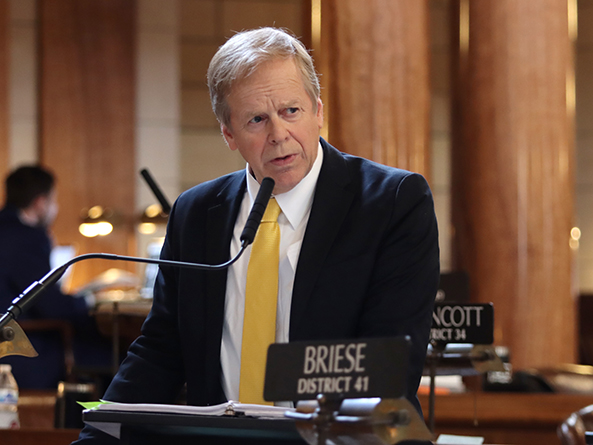Session Review: Executive Board
Lawmakers approved a proposal intended to expand access to video of legislative proceedings this session.
Nebraska Public Media currently broadcasts and live-streams video coverage of legislative public committee hearings and floor debate.
LB254, sponsored by Gordon Sen. Tom Brewer, requires the Executive Board to develop and maintain a publicly accessible, digital internet archive of that coverage beginning with the 2025 legislative session or as soon as live, closed-captioned video coverage of the Legislature is available.
Video will be closed-captioned in English and Spanish and indexed by bill number or date.
The bill includes provisions of LB552, sponsored by Sen. John Cavanaugh of Omaha, which extend the termination date for the Legislature’s Mental Health Care Capacity Strategic Planning Committee by one year, to Nov. 1, 2025.
The measure also extends the deadline by which the committee must contract with an independent consultant to Nov. 1, 2023, and the reporting deadline for findings and recommendations to Nov. 1, 2024.
Also included is Adams Sen. Myron Dorn’s LB90 that makes technical changes to performance audits conducted by the Legislature.
The Legislative Audit Office, a division of the Legislature, conducts performance audits to review state agency programs and evaluate agency success in effectively implementing legislative intent.
Among other provisions, the measure eliminates audit requirements for the Nebraska Advantage Act tax incentive program, which was replaced by the ImagiNE Nebraska Act in 2020, and removes references to outdated U.S. Department of Labor code designations.
LB254 passed on 48-0 vote and took effect immediately.
A proposed constitutional change to legislative term limits was advanced to general file by the Executive Board but was not scheduled for debate this year.
LR22CA, sponsored by Norfolk Sen. Robert Dover, potentially would extend the current limit of two consecutive four-year terms for state senators to three consecutive four-year terms. If approved by the Legislature, the proposed change would be placed on the general election ballot for voter approval.
The Executive Board held public hearings on several other proposed changes to legislative structure and operations this year.
LB54, sponsored by Omaha Sen. Terrell McKinney, would require any bill introduced in the Nebraska Legislature related to criminal or juvenile justice to be accompanied by a statement informing lawmakers of the effect the bill would have on communities of color or other marginalized groups.
Statements would be produced by the Legislative Research Office and would summarize the estimated impact on racial minority populations in Nebraska and could include any relevant research on the historical racial impact of similar legislation.
LB39, sponsored by Bellevue Sen. Carol Blood, outlines the same requirement for bills related to persons with disabilities.
Both bills remain in committee.
Also considered by the Executive Board but not advanced was a proposal under which Nebraska no longer would be the nation’s only one-house legislative system.
LR2CA, introduced by Bayard Sen. Steve Erdman, would create a House of Representatives and a Senate within the Nebraska Legislature, beginning with the January 2027 legislative session. If approved by the Legislature, the measure would be put before Nebraska voters for approval.
Membership in the proposed House of Representatives would be capped at 63 members and the Senate would contain 31 members. Each senate district would consist of three contiguous counties.
Erdman brought an amendment to the public hearing that would require state senators to be selected by an “appointment committee” rather than elected to their seats. Each three-member appointment committee would be made up of one individual from each county in a three-county district, selected to serve by the county board.


